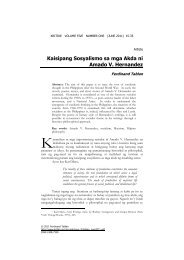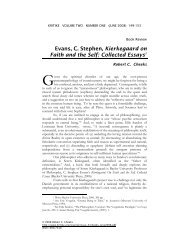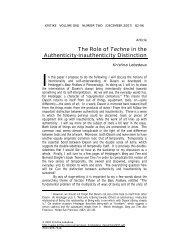The Paradox of Ipseity and Difference: Derrida's Deconstruction and ...
The Paradox of Ipseity and Difference: Derrida's Deconstruction and ...
The Paradox of Ipseity and Difference: Derrida's Deconstruction and ...
You also want an ePaper? Increase the reach of your titles
YUMPU automatically turns print PDFs into web optimized ePapers that Google loves.
50 THE PARADOX OF IPSEITY AND DIFFERENCE<br />
experience <strong>of</strong> différance. We are, thus, invited to participate <strong>and</strong> encounter the<br />
very reality that is signified by language. And despite <strong>of</strong> the limitations <strong>of</strong> our<br />
way <strong>of</strong> speaking about Being, we must dare to speak about Being.<br />
<strong>The</strong> very impetus <strong>of</strong> speaking about Being is justified by Derrida as an<br />
enduring project <strong>of</strong> participation <strong>and</strong> encounter. Our limitation is our singularity<br />
<strong>and</strong> the appearance <strong>of</strong> which, should be taken not as a source <strong>of</strong> frustration,<br />
but as an invitation. Indirectly, I think that Derrida is implying the possibility <strong>of</strong><br />
speaking about beings in their absolute ipseity <strong>and</strong> difference. It is in this regard<br />
that we might see the possibility <strong>of</strong> constructing an ontology based on the<br />
singularity <strong>of</strong> presence. Being occurs as itself <strong>and</strong>, at the same time, different from<br />
itself.<br />
<strong>Deconstruction</strong> is a way <strong>of</strong> looking at the immanent <strong>and</strong> transcendent<br />
reality behind texts. <strong>The</strong>re is always an interplay between the elements <strong>of</strong><br />
immanence <strong>and</strong> transcendence in so far as the in-itselfness <strong>of</strong> the object or the text is<br />
mediated by the transcendent state <strong>of</strong> the subject’s consciousness. This condition<br />
is in fact deconstructive <strong>and</strong>, as far as Derrida <strong>and</strong> his predecessors are concerned<br />
(Hegel, Husserl, Heidegger, Nietzsche, etc.), this is the condition <strong>of</strong> knowledge<br />
itself. Things appear to us as instances <strong>of</strong> singularities, they are always appear-ing,<br />
<strong>and</strong> we are always taking them as an appearance. <strong>Deconstruction</strong> itself is<br />
logocentric, but it differs with other type <strong>of</strong> reading or interpretation, in so far as<br />
it acknowledges the fact that all forms <strong>of</strong> reading are always contaminated by the<br />
consciousness’ mediation <strong>of</strong> its object. To look at reality as a singularity is to look<br />
at it with a sense <strong>of</strong> limitation <strong>and</strong> openness. Limitation in the sense that we are<br />
aware <strong>of</strong> the fact that the totality <strong>of</strong> what appears to us is in fact concealed. We<br />
have to realize that through openness we can further unwrap the mysteries <strong>of</strong><br />
Being’s coming-to-be, by participating in its activity <strong>of</strong> unveiling itself towards<br />
us. <strong>The</strong> epoch <strong>of</strong> logocentrism, for Derrida, is not merely the distress for the<br />
lack <strong>of</strong> distress for the question <strong>of</strong> Being, it is also essentially an invitation to<br />
participate in Being. By referring to Being <strong>and</strong> by effacing Being, we become the<br />
keepers <strong>and</strong> heirs <strong>of</strong> our father’s fathers, Derrida is suggesting an active<br />
participation in which we affirm ourselves <strong>and</strong> those who were there before us,<br />
not by mourning the monuments which the dead has erected, but by honoring<br />
these monuments <strong>and</strong> erecting new ones over them.<br />
References<br />
College <strong>of</strong> Accountancy, University <strong>of</strong> Santo Tomas, Philippines<br />
Austin, J.L., How to Do Things With Words, ed. J. Urmson <strong>and</strong> M. Sbisá (London:<br />
Oxford University Press, 1975).<br />
Derrida, Jacques, Dissemination, trans. by B. Johnson (Chicago: University <strong>of</strong><br />
Chicago Press, 1981).<br />
___________, Limited Inc. trans. by S. Weber <strong>and</strong> J. Mehlman (Evanston<br />
Illinois: Northwestern University Press, 1988).<br />
___________, Margins <strong>of</strong> Philosophy, trans. by A. Bass (Chicago: University <strong>of</strong><br />
Chicago Press, 1982).
















